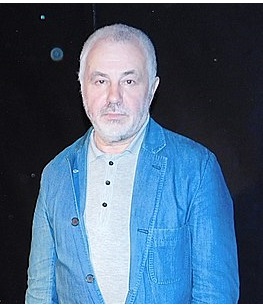Mikhail Volokhov
Mikhail Volokhov | |
|---|---|
 | |
| Born | 28 January 1955 Novomoskovsk, USSR |
| Citizenship | Russia, France |
| Website | |
| https://volokhov.net/ https://volokhov1mikhail.wordpress.com/ | |
Download books of Mikhail Volokhov or buy them on amazon
Mikhail Yurevich Volokhov (b. 28 January 1955 in Novomoskovsk) — writer, Russian and French playwright, poet, theatre theorist.
Biography[edit]
Born on 28 January 1955 to a family of scientists. Graduated from the Bauman Moscow State Technical University in 1979. In 1987 he moved to France, where Volokhov gained literary and theatrical fame as a Parisian émigré.[1]. From 1996 he lived mainly in Russia. Holds Russian and French citizenship.
Family[edit]
Has a daughter, MARIA VOLOKHOV, b. 1987[2][3].
https://www.youtube.com/channel/UCvKzQwDivTHmbibGw4SEdDw/videos Here Maria Volokhov sings seven of her own original songs: 1) AVENUE DE LA PLAGE 2) PIQNIQ 3) BARBIE 4) GTA 5) VENUS 6) SEA SEX FUN 7) RÊVE.
Theatre[edit]
Always returning to the existential theme of the philosophy of murder[4], the author, according to many critics, adheres to the style of the theatre of the absurd while remaining in the school of Russian objective-philosophical writing and reaches the global heights of classical tragedy, connecting cultural epochs with his work. Volokhov was first acclaimed in Paris. His play ‘Dead Man’s Bluff’ written with support from Eugène Ionesco, with whom Volokhov became friends[5][6], was staged by Bernard Sobel and performed by Denis Lavant and Hugues Quester, initially in France in a French-language version, and subsequently in Germany in a German adaptation played by Armin Rohde and Michael Weber. Bernard Sobel also staged ‘Dead Man’s Bluff’ in Paris, as part of a Trilogy: 1) ‘The Cherry Orchard’ by Chekhov (1903), directed by Stéphane Braunschweig); 2) ‘Maria’ by Babel (1933), directed by Bernard Sobel); 3) ‘Dead Man’s Bluff’ by Mikhail Volokhov (1989), directed by Bernard Sobel. Mikhail Volokhov made his own original film charged with dynamic and relentless polemics, ‘Chikatilo’s Calvary’, using his own script and featuring Volokhov as both director and actor. The film ‘Chikatilo’s Calvary’ was a participant in the 27th Moscow International Film Festival.
Mikhail Salov staged Mikhail Volokhov’s play ‘Paris Bound’[7]. An article by Lev Novozhenov in Rossiyskaya Gazeta, ‘We’re fine as we are, or our reply to Hamlet’ about the production of ‘Paris Bound’ by avant-garde playwright Mikhail Volokhov provoked a lively reaction, not only in theatrical circles.
Mikhail Volokhov is a member of the Paris PEN Club (since 1995) and of the Moscow Writers’ Union (since 1996); he is the author of more than fifteen plays. Volokhov’s first plays, ‘Dead Man’s Bluff’ and ‘Chikatilo’s Calvary’, were staged in Moscow by Andrei Zhitinkin in 1993 and 2001 respectively, with the acclaimed actors Sergei Chonishvili, Andrey Sokolov, Oleg Fomin and Dmitry Marianov (‘Dead Man’s Bluff’), and with Daniil Strakhov (‘Chikatilo’s Calvary’).
According to Anatoly Smelyansky[8]:
‘For many years our dramaturgy has been striving towards new contact with life. This was difficult, since there were barriers in all directions: thematic, plot, language, etc. In all respects a path had to be forged – and some plots and themes broke through. But here, in this case, I mean in Mikhail Volokhov’s play ‘Dead Man’s Bluff’, a breakthrough is happening in every way. Most vividly and obviously in a very controversial area, that of language. Although it seems to me that this is not just playing with what is permitted, or an attempt to break through to a point it seems easy to reach nowadays. No, and this ‘no’ is not just Russian obscenity – it’s in the character of those who play there, those who exist, these people; it’s also a way of thinking, a type of life and a way of understanding the world. Therefore it seems to me that this play is a definite breakthrough to the dramaturgy that is now being born in our country.
Film[edit]
Mikhail Volokhov’s original film based on his play ‘Chikatilo’s Calvary’ (2005) was a participant at the 27th Moscow International Film Festival in the programme Alternative Russian Cinema, and at the festival Avant-Garde Cinema in Nice (2007)[9]
Works[edit]
- Dead Man’s Bluff
- Lyudmila Gurchenko Lives
- The Macbeth Chronicles – Kings of the Entrance
- Rublyovka Safari
- Lesbians Roaring Like A Tsunami
- Paris Bound
- Chikatilo’s Calvary
- Immaculate Conception
- The Great Consoler
- Diogenes. Alexander. Corinth
- Kilimanjaro On Your Lips
- Bare Snow Carelessly Tender
- The Companion
- Forty-Eighth Degree of Solar Latitude
- Bullets in Chocolate
- His Majesty’s Executioner
- Nature (a fairytale)
Drama[edit]
‘THE GREAT CONSOLER’[10]. Sochineniya/Moskva, KITONI, 2015. - 672 pp. Cover design: Maria Volokhova
- Volokhov — The Great Consoler (Review by Irina Khakamada) (on a new volume featuring 18 plays by Mikhail Volokhov).
References[edit]
- ↑ "RUSSIE/THEATRE RENCONTRE AVEC MIKHAÏL VOLOKHOV UN EMIGRE A BRIDE ABATTUE". Le Monde.fr (in français). 1993-01-28. Retrieved 2023-11-03.
- ↑ France, Medias (2018-08-27). "Beephone, La Start-Up Française Qui Reconditionne Les iPhones". Forbes France (in français). Retrieved 2023-11-03.
- ↑ "Maria Volokhova | Art & Design". cargocollective.com. Retrieved 2023-11-03.
- ↑ "Презентация пьесы Михаила Волохова". www.kommersant.ru (in русский). 1993-01-12. Retrieved 2023-11-03.
- ↑ Аникина, Оксана (2006-09-26). "Ударим Платоновым по похабщине!". Правда.Ру (in русский). Retrieved 2023-11-03.
- ↑ Буккер, Игорь (2006-07-05). "Скандальный драматург Михаил Волохов о матерщине". Правда.Ру (in русский). Retrieved 2023-11-03.
- ↑ Михаил Волохов : "И в Париж". Постановка Мика Салова., retrieved 2023-11-03
- ↑ Буккер, Игорь (2006-04-12). "Великая Отечественная Игра современной драматургии". Правда.Ру (in русский). Retrieved 2023-11-04.
- ↑ "«Вышка» Чикатило, 2005 - «25-й кадр» | Независимый журнал о кино". 25-k.com. Retrieved 2023-11-04.
- ↑ Буккер, Игорь (2016-08-28). "Михаил Волохов: Творческий путь Париж — Москва". Правда.Ру (in русский). Retrieved 2023-11-04.
This article "Mikhail Volokhov" is from Wikipedia. The list of its authors can be seen in its historical and/or the page Edithistory:Mikhail Volokhov. Articles copied from Draft Namespace on Wikipedia could be seen on the Draft Namespace of Wikipedia and not main one.
